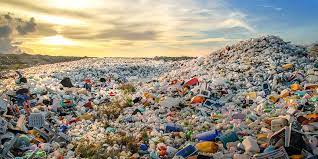Greenpeace Africa joins the world in celebrating the 50th anniversary of World Environment Day, hosted by Côte d’Ivoire. This day has been set aside by the United Nations to raise awareness on environmental issues and call for action for the protection of our environment.
The theme of this year’s World Environment Day focuses on solutions to plastic pollution and finding ways to #BeatPlasticPollution.
“It is encouraging to see countries come together on this special day to take urgently needed actions towards a plastic-free future.
This move shows that our governments are slowly recognising the threat plastics pollution poses to life on this planet, to our ecosystems and the climate,” said Greenpeace Africa’s West Africa Regional Coordinator, Nono Prudence Wanko Djiodio. “We hope that this recognition will energize them to tighten their opposition to plastic production which is projected to rise significantly in the next decade.”

Africa has come a long way on the journey to creating a single-use plastic-free continent with many victorious milestones to celebrate across the continent. Out of 54 states, 34 have either passed a law banning plastics and implemented it or have passed a law with the intention of implementation. However, the steps are still heavy when it comes to the implementation of these regulations.
“We have seen countries such as Rwanda taking the lead in the quest to find a global binding instrument to deal with the plastic crisis and others like Morocco whose consumption of the raw material used in manufacturing plastic bags dropped by 50 percent since its plastic bag ban came into effect in 2015. We urge other African countries to join them in effective implementation of the existing plastic regulations,” Continued Wanko.
:max_bytes(150000):strip_icc()/plastic-pollution-f5728798cbdb4fd0a8e223002d168a9f.jpg)
The proponents of single-use plastics are also pushing for more plastic production and exportation into Africa. This could undermine progress made by countries to ban single-use plastic products and combat pollution. Africa’s leadership has the power to address these challenges and bring to an end this illegal and neocolonialist way of dealing with waste once and for all.
Plastic pollution is a global crisis and governments need to collaborate in a more coordinated approach to end this crisis through a legally binding agreement that will deal with the plastic pollution from production to disposal. Governments in Africa and around the world must recognize that this is a unique opportunity to stem the tide of this global crisis.
“A Plastic free future is possible in Africa if governments resist the corporate capture by plastics proponents and take bold actions towards solving this crisis. Cooperation among governments across Africa and the world is critical in forging a strong global plastic treaty to finally turn off the plastic tap for the sake of our communities, our children, our climate and our continent,” concluded Mrs. Djiodio.







More Stories
Optiven Launches Exciting Easter Bonanza for Real Estate Investors
Kenya Eyes Stronger China Ties at Global Digital Trade Expo Forum
Viktorija Radman appointed Mobile Ecosystem Forum Board member